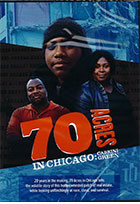
70 Acres in Chicago: Cabrini Green 2015
Distributed by Ronit Bezalel, 1239 W. Ardmore #2, Chicago, IL 60660
Produced by Ronit Bezalel
Directed by Ronit Bezalel
DVD , color, 58 mins. English, with subtitles
General Adult
Chicago, History, Race Relations, History, Economics, Urban and Regional Planning, Sociology
Date Entered: 11/30/2016
Reviewed by Sharadha Natraj, University of Wisconsin Milwaukee, School of Architecture and Urban PlanningLess than a mile from Michigan Avenue in Chicago, with its upscale retail and exclusive high-rise buildings, lies Cabrini Green, built as housing for the poor and remembered as a case study in the failure of urban housing and in the politics of race and economy in Chicago.
In 70 Acres in Chicago: Cabrini Green, filmmaker Ronit Bezalel traces the history of the development, from its construction in the 1940s when it housed diverse families in need of affordable housing, to the segregated project it became, and traces the neglect and intentional disrepair that led to its demolition and conversion to a gentrified, picture-perfect neighborhood with a mixture of market-rate condos and affordable housing.
In 70 Acres in Chicago: Cabrini Green, filmmaker Ronit Bezalel traces the history of the development from its construction in the 1940s, when it housed diverse families in need of affordable housing, to the segregated project it became, and studies the neglect and intentional disrepair that led to its demolition and conversion to a gentrified, picture-perfect neighborhood with a mixture of market-rate condos and affordable housing.
The film invites questions: how does a community prepare for such cataclysmic change? Where were residents moved to? How did they cope? What was the impetus behind the decisions made by officials and developers? Does a social experiment in gentrification and urban renewal justify the methods by which it is accomplished, with poverty-stricken people without a voice being shuttled around? Bezalel uncovers these problems and leaves them open for discussion.
With its complexity of social and economic issues, this film can be the starting point for courses in several subjects, each pulling on a different thread, stimulating further research and discourse.
Recommended for college-level courses.